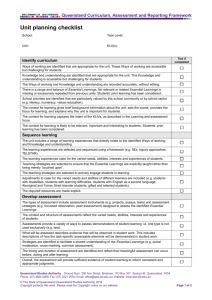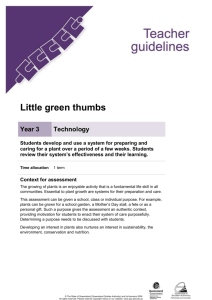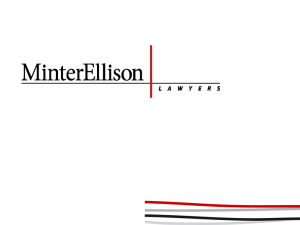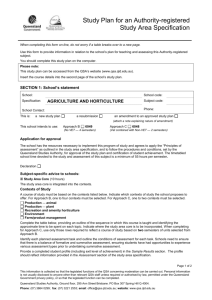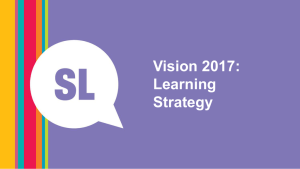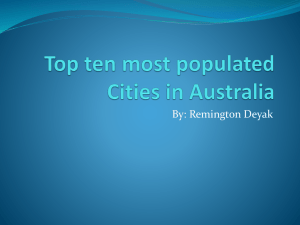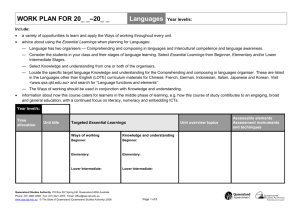Studies of Society & Environment (SOSE) Work Plan
advertisement
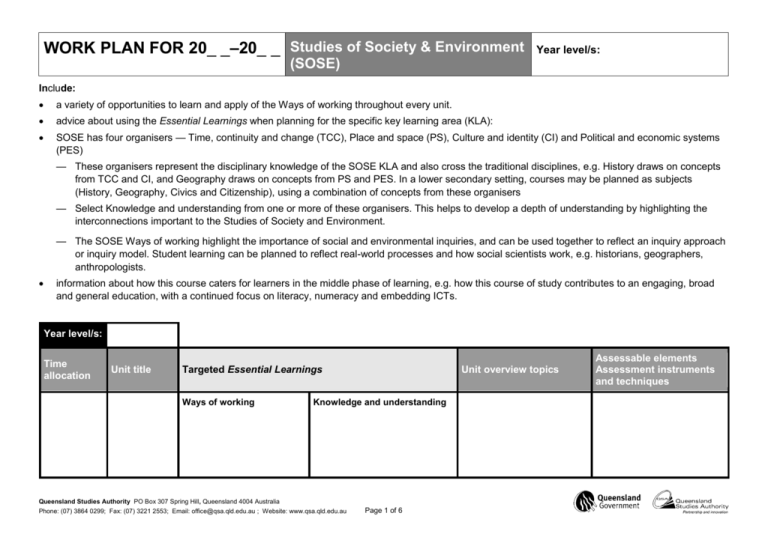
WORK PLAN FOR 20_ _–20_ _ Studies of Society & Environment Year level/s: (SOSE) Include: a variety of opportunities to learn and apply of the Ways of working throughout every unit. advice about using the Essential Learnings when planning for the specific key learning area (KLA): SOSE has four organisers — Time, continuity and change (TCC), Place and space (PS), Culture and identity (CI) and Political and economic systems (PES) — These organisers represent the disciplinary knowledge of the SOSE KLA and also cross the traditional disciplines, e.g. History draws on concepts from TCC and CI, and Geography draws on concepts from PS and PES. In a lower secondary setting, courses may be planned as subjects (History, Geography, Civics and Citizenship), using a combination of concepts from these organisers — Select Knowledge and understanding from one or more of these organisers. This helps to develop a depth of understanding by highlighting the interconnections important to the Studies of Society and Environment. — The SOSE Ways of working highlight the importance of social and environmental inquiries, and can be used together to reflect an inquiry approach or inquiry model. Student learning can be planned to reflect real-world processes and how social scientists work, e.g. historians, geographers, anthropologists. information about how this course caters for learners in the middle phase of learning, e.g. how this course of study contributes to an engaging, broad and general education, with a continued focus on literacy, numeracy and embedding ICTs. Year level/s: Time allocation Unit title Targeted Essential Learnings Ways of working Unit overview topics Knowledge and understanding Queensland Studies Authority PO Box 307 Spring Hill, Queensland 4004 Australia Phone: (07) 3864 0299; Fax: (07) 3221 2553; Email: office@qsa.qld.edu.au ; Website: www.qsa.qld.edu.au Page 1 of 6 Assessable elements Assessment instruments and techniques SOSE course of study mapped to Essential Learnings — Ways of working Units of work Year 8 Ways of working Students are able to: Unit title Semester 1 identify a research focus from broad topics and design focus questions and sub-questions plan investigations, using discipline-specific inquiry models and processes research and analyse data, information and evidence from primary and secondary sources evaluate sources of data, information and evidence for relevance, reliability, authenticity, purpose, bias and perspective draw conclusions and make decisions supported by interpretations of data, information and evidence communicate descriptions, decisions and conclusions, using text types specific to the context and purpose and the conventions of research-based texts respond to local and global issues by taking action in planned and enterprising ways apply strategies for making group decisions and for taking informed social and environmental action reflect on different perspectives, and recognise and evaluate the influence of values and beliefs in relation to social justice, the democratic process, sustainability and peace reflect on learning, apply new understandings and justify future applications. www.qsa.qld.edu.au © The State of Queensland (Queensland Studies Authority) 2008 Page 2 of 6 Year 9 Semester 2 Semester 1 Semester 2 SOSE course of study mapped to Essential Learnings — Knowledge and understanding Units of work Year 8 Knowledge and understanding Semester 2 Semester 1 Semester 2 Unit title Semester 1 Year 9 Time, continuity and change Social, political, economic and cultural changes and continuities are connected to particular events, ideas and contributions, and can be interpreted from different perspectives. Australian narratives and identities have been shaped by 20th century events including major conflicts, waves of immigration, social divisions and changes, and government relations with other nations. Important ideas of democracy, government and law, citizenship rights and public decision making, and the concepts of power, dissent and civic duty, developed from ancient to modern times and from Eastern and Western cultures. Evidence of events in Australian, Asian, Pacific and global settings can be interpreted from different perspectives and values positions. (Continued on next page) www.qsa.qld.edu.au © The State of Queensland (Queensland Studies Authority) 2008 Page 3 of 6 Place and space Environments are defined by spatial patterns, human and physical interactions, and sustainable practices can balance human activity and environmental processes. Australia, the Asia–Pacific region and other global settings are defined by a range of natural characteristics and processes, including landforms, vegetation and climatic zones, and human activities, including cultural, economic and political activity. Interrelationships between human activity and environments result in particular patterns of land and resource use, and can cause environmental problems. Governments and communities need to balance economic, social, political and environmental factors through sustainable development, consumption and production. Physical environments are defined by spatial patterns, including the arrangement of elements on the Earth’s surface, the definable areas of the Earth’s surface, the space between different locations, and absolute and relative location. Maps, including topographic, political and thematic maps, are developed with particular features, including scale, contour lines and human-created boundaries, and use the specific skills of observing, visualising, estimating, sketching and measuring. Culture and identity Cultures and identities are shaped by a range of factors, and societies promote cohesion and diversity in different ways. Group identities are influenced by different factors, including family, communities, nationality, socioeconomic factors and religious beliefs. Cultural diversity in Australia is influenced by public opinion, media portrayals, government policies and the impacts of globalisation. Community perceptions of Aboriginal cultures and Torres Strait Islander cultures have resulted in positive and negative responses to Indigenous people. Contact between cultures has produced movements to improve democratic participation and citizenship rights for specific groups. Cultural research involves following protocols and acting sensitively. (Continued on next page) www.qsa.qld.edu.au © The State of Queensland (Queensland Studies Authority) 2008 Page 4 of 6 Political and economic systems Societies consist of interconnected decision-making systems, institutions and processes based on principles and values. Australia’s government systems are based on liberal democratic principles, including the “common good” and parliamentary elections, perform functions, including developing policy and formulating legislation, and have institutions and instruments, including the High Court and Acts of Parliament. Australia’s legal and justice systems are based on principles, including an independent judiciary, perform functions, including the protection of rights, and use different types of law and courts. Australian citizenship involves recognising global perspectives and balancing majority rule against respecting minority interests. Australia’s relationships with other nations involve membership of international organisations and participation in global systems of law, diplomacy, human rights, trade and security. Australia’s economic system is shaped by a range of economic activities, including production and consumption, and government regulation. www.qsa.qld.edu.au © The State of Queensland (Queensland Studies Authority) 2008 Page 5 of 6 SOSE course of study mapped to Essential Learnings — Assessable elements Units of work Year 8 Assessable elements Unit title Semester 1 Knowledge and understanding Investigating Communicating Participating Reflecting www.qsa.qld.edu.au © The State of Queensland (Queensland Studies Authority) 2008 Page 6 of 6 Year 9 Semester 2 Semester 1 Semester 2


